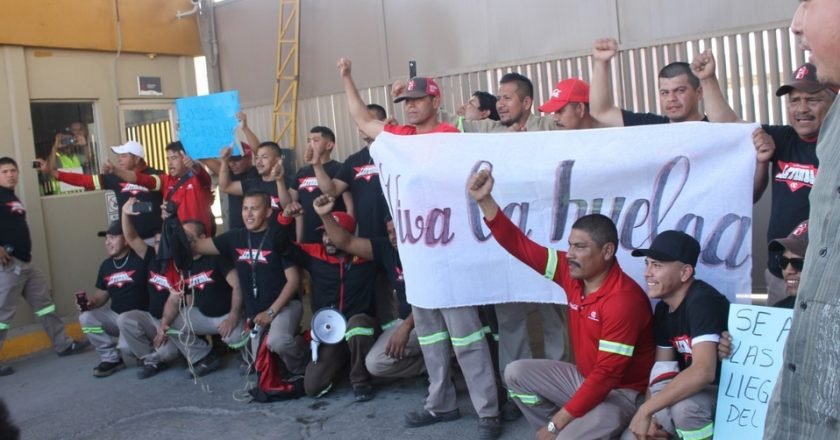February 20, Wednesday, 1 pm; Flying Samaritans Bingo at Popotla Jr (across from El Nido Restaurant). Multiple games/cards and prizes. www.flyingsamaritans.org.
February 26, Tuesday, 8:30 am – 12 pm; 4th Annual Women’s Culture Movement of Rosarito at IMAC (behind Banamex). Featured topics include economic stability, discrimination, and family violence.
March 5, Tuesday, 4 – 6 pm; Wine and Design Mardi Gras Party at De Colores Studio (k40, near Santini’s). Tickets $6 at app.getoccasion.com. Dress for the theme (optional). Paint wine or margarita goblet. Light snacks provided. Facebook.com/ Wine and Design Mardi Gras Party.
March 9, Saturday, 5 – 8 pm; The Sweet Sixx Swingin’ Cabaret Burlesque Review at Hotel Calafia. Live band, cabaret, comedy, flappers, 1920-40 costume contest. Advance tickets online: $15; BGLC Members, $10; $20 at the event. Must be 18! www.SweetSixx.com.
March 15, Friday, 12 – 3 pm; Cruz Roja Rosarito St. Patrick’s Day Luncheon buffet at Charly’s Restaurant (k 37.5). $15 tickets available at the Cruz Roja Rosarito Thrift Store, Monday – Saturday, 10 – 3. All proceeds benefit Cruz Roja Hospital. Facebook.com/ Cruz Roja Rosarito.
March 16, Saturday, 5 – 9 pm; Flying Samaritans presents an evening of Casino Royale. Elegant Dress. Limited tickets, $40. Includes $400 in chips, appetizers. Drink specials. Prizes. Calafia’s Titanic Room (35.5km) All proceeds to benefit Flying Samaritans Rosarito. Tickets at www.flyingsamaritaansrosarito.org, or contact Dean Stalcup @ RDSTALCUP@aol.com; 858-538-5922 or 661-100-6894.
March 17, Sunday, 1 – 4 pm; Cruz Roja Primo Tapia St. Patrick’s Day Celebration at Bobby’s by the Sea. Advance purchase $20 ticket includes entrance, Irish stew, and soda bread. $25 at the event. Tickets available from Board members, Cruz Roja Primo Tapia Thrift Store or PayPal. 50/50, raffle, and Mayan Art Sale. Proceeds to benefit Cruz Roja Rosarito Hospital. www.cruzrojaprimotapia.com.
February 20, Wednesday, 5 pm; Cinema Wednesdays at CEART. “Quisiera ser Grande” (“Big”) directed by Penny Marshall, starring Tom Hanks. Free. Facebook/ CEART Playas de Rosarito; www.icbc.gob.mx; 661-100-6338.
February 21, Thursday, 10 am; Meeting of FRAO (Foreign Residents Attention Office) at Hotel Calafia, Titanic Room. Speaker TBA. Please RSVP to frao.office@gmail.com
February 24, Sunday, 11:30 am; Seniors Supporting (Apoyando) Seniors presents Doug Rye and Winifred Morice in “Love Letters by A.R. Gurney. Location: San Antonio Del Mar, 299 Bahia. Continental breakfast to precede play, Tickets $30 via paypal.me/RCorsaro, or Reggie.Corrsaro@gmail.com. Shuttle available 11:30 – 12:00 for cars parking at the park near the south entrance, 1-626-825-1609.
February 27, Wednesday, 1 pm; Ladies Let’s Lunch! At the Viaje Oyster Bar in the La Quinta Hotel. Facebook.com/ Ladies Let’s Lunch or Facebook.com/ Sandy Eddahbi.
February 27, Wednesday, 5 pm; Wednesdays at the Cinema: “Intensamente” (Intensely), directed by Pete Docter. A girl learns to adapt to living in San Francisco and her new school. Free. Facebook/ CEART Playas de Rosarito; www.icbc.gob.mx; 661-100-6338.
March 9, Saturday, 5 – 8 pm; The Sweet Sixx Swingin’ Cabaret Burlesque Review at Hotel Calafia. Live band, cabaret, comedy, flappers, 1920-1940 costume contest. Advance tickets: $15; BGLC Members, $10; $20 at the event. Must be 18. www.sweetsixx.com.
Every Monday through Thursday, 9am – 12pm; Pickleball at Punta Azul Tennis Center. Cos: $1 court fee per person per day. Organized by Robert Canaan. BYO paddle and ball. Information: Facebook.com/ Rosarito Pickleball
Every Wednesday, 10am – 12pm; Adult painting class at IMAC Rosarito in the main park. Bilingual instructor. 200 peso registration/ 300 pesos per month. IMACRosarito@gmail.com; Facebook/imacrosarito.
Every Friday, 12 – 2 pm; Adult painting class at IMAC Rosarito in the main park. Bilingual instructor. 200 pesos registration/ 300 pesos monthly. IMAC Rosarito@gmail.com; Facebook/imacrosarito.
Every Sunday 4 pm. Cultural Sundays in the park. Local Mexican and American dancers and musicians. At the IMAC in Abelardo L. Rodriguez park, west of Banamex. Facebook IMAC Rosarito. Free.
Every Sunday 2 – 4 pm at the IMAC Central Park (behind the Banamex on Juarez) Dancing for seniors. Salsa and merengue (among others) tunes designed to not throw out a hip. www.facebook.com/IMAC Rosarito
Second Sunday of every month, Pet sterilization by the Baja Spay and Neuter Foundation at the Centro de Diagnostico Clinico Vetrinario, ave. Queretaro #2331-3, Col Cacho, Tijuana. 200 pesos, 661-124-3619, or Robin at www.BajaSpayNeuter.org.
Last Sunday of every month, Jewish Chavurah. Gordon Kane – gordonmkane@gmail.com.
Every Monday, 10:45 am, duplicate bridge at Baja Gold Bridge Club, KM 42 at the Rosarito Beach Christian Church. bajagoldcoastbridgeclub@gmail.com.
Every Tuesday – Rotary Club meets at Rosarito Beach Hotel. 664-376-2620.
Every Tuesday 10am to 11am. Chair Yoga – Rosarito Wellness, Healing, Living at IMAC Park, room 1 in Rosarito (behind Banamex). Improve Balance & Coordination. Receive all the benefits of yoga in a gentle, Healing, Meditative yoga class where a chair is used for support and balance. Bring water, small towel and comfortable clothing. Instructor: Erendira Abel, Certified Holistic Health Specialist. $5 per class, paid at beginning of month. For registration and location: (661) 614-6036 Mexico or (619) 632-2965 US. Email: wellnesshealingliving@gmail.com
Every Tuesday. 9:00 am. Board Meeting for Yo Amo Rosarito at Ortega’s Buffet. See what events are under consideration or volunteer to help plan and run upcoming events.
Every Wednesday, 7:30 – 9:00 am; Tai Chi classes with certified instructor Eugenio Encinas at Galeria Fausto Polanco Rosarito. 350 pesos per month. Alyce: 664-368-6733; Alberto: 661-125-9191.
Every Second Wednesday (except December). 10 am. Friends of the Library meeting at main library of IMAC building next to Abelardo Rodríguez Park. Promotes reading and literacy in Rosarito. www.friendsofthelibrary.com.mx. 661-612-3659.
Second and FourthWednesday, 1 pm; Cruz Roja Primo Tapia Bingo at El Pescador Restaurant. 6 games/ 2 cards for $5. Reduced price menu; Jamesphausmann@gmail.com; 1-623-217-9795.
Every Third Wednesday of the Month (except December), Flying Samaritan’s General Meeting at Villas Del Mar (k 31.5). www.flyingsamaritansrosarito.org; Susansmithz@hotmail.com; 1-858-234-2360; 661-100-6066.
Every Third Wednesday, 10 am, Meeting of Rosarito Sister Cities at City Hall, Fojadores Room, 2nd floor. Information and RSVP: FRAO@Rosarito.gob.mx.
Every Third Wednesday (except December) 1:00 – 4:00 pm, Flying Samaritan’s Outrageous Bingo at Popotla Jr. Restaurant (across from El Nido – formerly California Fresh), Food and Drink specials; free parking behind restaurant; Six games, 4 cards for $10; Karen: kajomc@yahoo.coojm; (US) 1-818-515-0067l (MX) 664-609-3419.
Every Last Wednesday, 11:30 am, Wellness Wednesday Workshop “Intentionally Aging Gracefully” with Erendira Abel at IMAC a Abelard Rodriguez Park (behind Banamex). $6, and pre-registration is required. Info: wellnesshealingliving@gmail.com; (US) 1-619-737-2453, (MX) 661-614-6036.
Every Thursday. 8:30 am. Local Board of Realtors (APIR) meets at Oceana Grill. Good place for buyers or sellers to find a Realtor
Every Thursday, 10:30 am, Learn Spanish “Naturally” with Erendira Abel at Rosarito Beach Christian Church. $5, and pre-registration is required. Info: wellnesshealingliving@gmail.com; (US) 1-619-737-2453, (MX) 661-614-6036.
Every Second Thursday. 10 am. Cruz Roja Volunteers, Rosarito Chapter General Meeting at Popotla Restaurant. www.cruzrojarosarito.org.mx; President: Mary Moreno, miqueridomx@yahoo.com.
Every Third Thursday. 10 am. General Meeting for FRAO, Foreign Residents Assistance Office. Open to the public. Calafia Hotel. Speaker’s presentation. FRAO@Rosarito.gob.mx.
Every Fourth Thursday of the month, 12 pm, Baja Babes, the Rosarito Chapter of the Red Hat Society for ladies over 50 monthly luncheon. Each month a different restaurant. margit@prodigy.net.mx.
Every Saturday, 10:00 am at IMAC Central park. Chess for all ages. www.facebook.com/IMAC Rosarito.
Every First Saturday. 10 am. United Society of Baja California (USBC) general meeting at Casa Blanca Restaurant, Rosarito Beach Hotel. Good info for the English speaking community of charitable, community service and social organizations. www.unitedsocietyofbaja.org. 661-614-1113.
Every First Saturday. Noon-sundown. Open Studio Art Walk, a free tour of galleries in Rosarito Beach Hotel commercial center. Meet artists at work in their studios. pacothepainter@hotmail.com
Every Third Saturday. 1pm. USBC, United Society of Baja California, monthly potluck dinner, at La Maroma sports bar, across from Burger King. Different theme every month. Usually live entertainment. Free. Membership $20 per year.
Every day but one day at a time AA Grupo Gringo meets daily #16 Mar Meditteraneo (two blocks behind Del Mar Beach Club). Saturday, 3:00; Sunday, Monday, Thursday: 10:00 am; Tuesday, Wednesday, Friday: 6:00 pm. Additional meetings in Cantamar (just south of the footbridge) Tuesday and Friday, 10:00 am. 661-614-1678.























